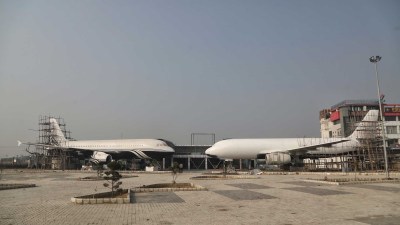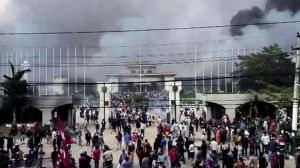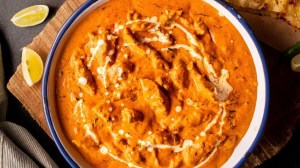Sea change in DMK
Few indian politicians would dare to take on god. and most north Indian politicians consider the DMK’s rationalist stance on the existence of Ram...

Few indian politicians would dare to take on god. And most north Indian politicians consider the DMK’s rationalist stance on the existence of Ram and Ram Sethu a public relations disaster. In India gods and politics are a very potent mix. L.K. Advani turned around the fortunes of the BJP by launching his motorised rath yatra on the Ram Janmabhoomi issue. India’s first prime minister may have termed himself as an atheist but his daughter, Indira Gandhi, a far shrewder politician, made it a point to be routinely photographed propitiating various gods at every major religious shrine. She also ensured that her father was cremated with Hindu rituals. The Gandhi family has continued Indira’s tradition. The conspicuous red puja threads on Sonia Gandhi’s wrist are meant to emphasise that she has accepted the religion of her husband, rather than the Roman Catholic faith of her childhood. Even Marxist leaders in Bengal make the rounds of the Durga Puja pandals, claiming self-righteously that this is really a cultural rather than a religious activity.
If Tamil Nadu has more ambivalent views towards Hinduism than other parts of the parts of the country it is thanks to E.V. Ramasami Naicker, founder of the Dravida movement. Some years back, when Jayalalithaa jailed the Shankaracharya of Kanchi, the BJP jumped to his defence. The party with its north Indian ethos assumed that by defending the honour of a covenanted godman, no matter how suspect, it would tap a groundswell of support. The BJP miscalculated. Its campaign to defend the seer was a non-starter and the party has failed to make a dent in Tamil Nadu politics.
Tamil Nadu is different thanks largely to Naicker, the iconoclastic social reformer popularly known as Periyar. A contemporary of Gandhi, he left the Congress disillusioned over the party’s failure to eradicate the caste system. Periyar’s original target were the powerful brahmins, the Iyers, Iyengars and Madhavas, who controlled the temples with their vast tracts of land and also monopolised all levers of temporal power. In his fight against the hegemony and corruption of the brahmins, Periyar targeted Hinduism, since brahmins claimed the exclusive right to be the keepers of the faith and lay down the norms of worship. As part of the Dravida movement, pictures of gods were garlanded with slippers, Ravana Leelas celebrated to counter the Ram Leelas organised in Aryan, north Indian culture. Thanks to the Dravida movement, brahmins were totally marginalised in Tamil Nadu. They constitute a mere 3 per cent of the state’s population.
The Dravida movement against the organised Hindu religion was less successful. Today many representatives of the Dravida parties do not hide their religious practices. Some have been known to even walk on beds of hot coals to propitiate the gods. The AIADMK’s Jayalalithaa, a brahmin herself, regularly visits shrines and once donated an elephant to the Guruvayur temple in Kerala. Even some of Karunanidhi’s immediate family have shown signs of religiosity. His son Stalin and his wife have been blessed by Sai Baba. Karunanidhi’s second wife, Dharmammal, has been known to visit temples. During Karunanidhi’s present tenure as chief minister, 3,000 temples are reported to have been renovated. Tamil Nadu political analyst R. Rajagopalan believes that the ageing Karunanidhi has dug in his heels simply because he wants to be seen as the last true upholder of Periyar’s anti-religion crusade.
But while Karunanidhi is busy grandstanding on the issue of atheism in the south, the Congress fears an adverse reaction in the north. The Congress can ill afford to be associated with godlessness, particularly with the Gujarat assembly elections coming up. Chief Minister Narendra Modi is keen to proclaim that his political rivals are denying the existence of Lord Ram. With the Supreme Court coming down heavily on the Tamil Nadu government for going ahead with a bandh, Karunanidhi can get tarred by his political opponents as both anti-god and anti-judiciary — particularly with Shipping Minister T.R. Baalu’s barely veiled strong criticism of the court on Monday.
The Tamil Nadu unit of the Congress has always nurtured a grievance that its alliance with the DMK is unequal and unfair. The DMK monopolised the gains, including plum ministerial portfolios at the Centre, while the Congress got little in return except the support of 16 MPs for Manmohan Singh’s government. When the Centre proposed disinvestment of the Neyveli Lignite Corporation, Karunanidhi threatened that his party would walk out of the government. The PM retreated. Now the Congress central leadership is beginning to realise why its state unit describes the alliance as a one-sided partnership. Karunanidhi has made clear his displeasure over the Centre’s procrastination in filing a fresh affidavit in the Ram Sethu case. Similarly the call for restraint by Veerappa Moily, the Congress leader in charge of Tamil Nadu, on the eve of the Tamil Nadu bandh did not suit the DMK. Parliamentary Affairs Minister Priya Ranjan Dasmunshi had to quickly assuage the DMK’s hurt feelings by describing Karunanidhi as one of the country’s greatest stalwarts and making clear that there is no question of taking action against his government as suggested by the court.
But privately Congresspersons question why their party needs to pay for the sake of an ally which has alienated voters throughout the country, including Tamil Nadu, by refusing to appreciate the religious sensitivities of a vast majority of Indians. The tie-up with the DMK, which is handicapped by anti-incumbency, may be of little advantage to the Congress in case of an early general election. Already the weathercock PMK, with its powerful Vanniyar vote bank, has dumped the DMK alliance in the state although it continues to be a part of the UPA at the Centre. Another former ally, Vaiko’s MDMK party, is firmly with Jayalalithaa. With the BJP and AIADMK cosying up to each other, many feel the Congress’s best bet in the forthcoming election could be a tie-up with actor Vijaykanth, who has shown he has the clout and charisma to break the stranglehold of Dravida parties on Tamil Nadu’s politics.


- 01
- 02
- 03
- 04
- 05





























